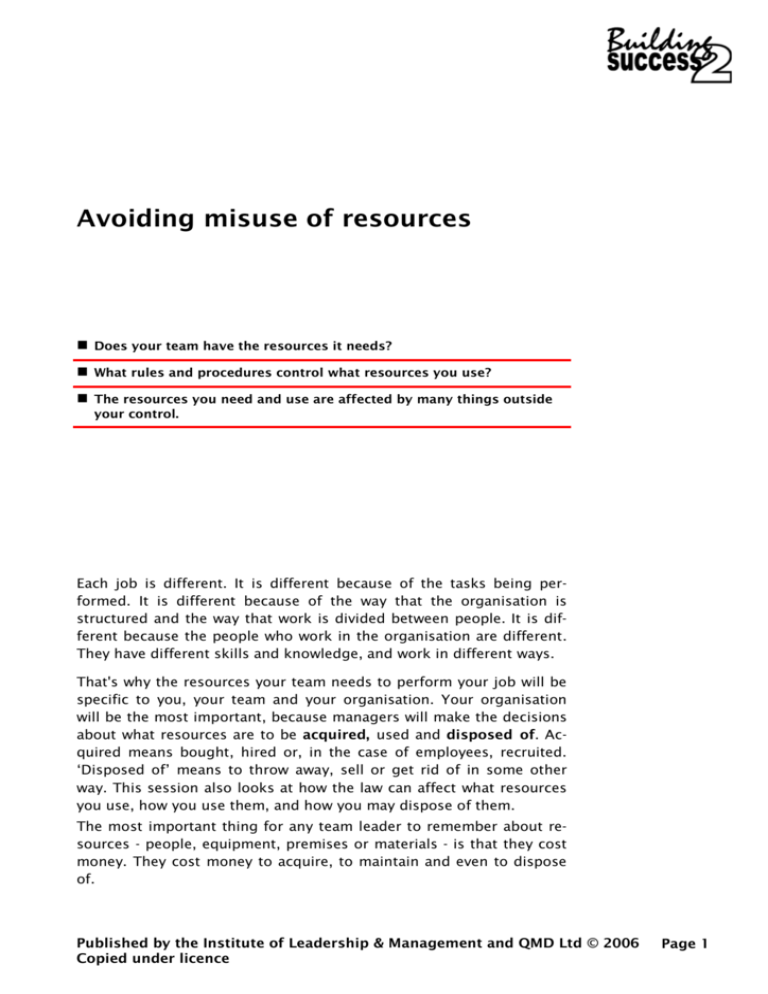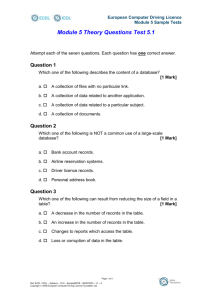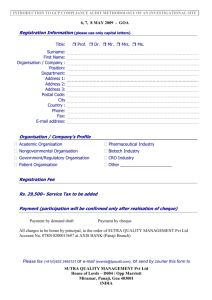Avoiding misuse of resources
advertisement

Avoiding misuse of resources Avoiding misuse of resources Does your team have the resources it needs? What rules and procedures control what resources you use? The resources you need and use are affected by many things outside your control. Each job is different. It is different because of the tasks being performed. It is different because of the way that the organisation is structured and the way that work is divided between people. It is different because the people who work in the organisation are different. They have different skills and knowledge, and work in different ways. That's why the resources your team needs to perform your job will be specific to you, your team and your organisation. Your organisation will be the most important, because managers will make the decisions about what resources are to be acquired, used and disposed of. Acquired means bought, hired or, in the case of employees, recruited. ‘Disposed of’ means to throw away, sell or get rid of in some other way. This session also looks at how the law can affect what resources you use, how you use them, and how you may dispose of them. The most important thing for any team leader to remember about resources - people, equipment, premises or materials - is that they cost money. They cost money to acquire, to maintain and even to dispose of. Published by the Institute of Leadership & Management and QMD Ltd © 2006 Copied under licence Page 1 Avoiding misuse of resources The cost of acquiring resources includes more than the wages or price of the resources themselves. It also includes the time spent deciding who to recruit or what vehicle to buy. Some organisations have a high turnover of staff. This means that people leave their jobs frequently. It may cost the organisation large amounts of money simply getting enough people to keep the organisation going. Most equipment needs regular servicing or maintenance. Computers often need upgrading. People need to be ‘maintained’ or to be trained and have their skills updated - the cost of training staff in using new computer software is often far more than the cost of buying it in the first place! Premises need to be maintained. Left alone, factories, offices, warehouses and shops will start to deteriorate quickly. It costs money to clean, redecorate and repair buildings. Some resources can be difficult to dispose of. Sacking people is expensive unless their rights are respected. Environmental regulations make it expensive for organisations to get rid of waste products, to encourage them to clean up their operations and recycle materials if possible. This case study shows you why this is. Case Study Jimmy is the team leader in the horticultural maintenance section of a local council. He and his team look after the parks and other public places in the council's area. Jimmy's team have got a major task to do. They are due to empty and clean out a small lake in the town park. Jimmy expects to hire a pump and pump the water down the drain, but his manager, Alan, says they have to wait until Environmental Services have checked it out. Jimmy: "Why, what's the problem. It's only water. It's a bit muddy, but it's still only water." Alan: "Yes, I know, but there's been a lot of fuss about the smell recently, and we're hoping it's just because the water's a bit stagnant. But there's a possibility that it's been contaminated from somewhere else. If that's the case, then we may not be able to put it into the drainage system. We might have to pump it into tankers and take it for treatment." Jimmy: "That'll be expensive" Alan: "I know. It'll take the whole of my maintenance budget for the year if that happens. Let's just cross our fingers." Published by the Institute of Leadership & Management and QMD Ltd © 2006 Copied under licence Page 2 Avoiding misuse of resources Taking care of resources Because of the costs of resources, most organisations are very careful about how they acquire, maintain and dispose of them. Rules about recruiting people and purchasing materials are designed to make sure that you get the right resources at the best price. Rules about how resources are used make sure that they aren't misused. Misuse means not using them properly. It can mean that equipment, premises or materials need replacing earlier than they should be. It can also mean that they don't produce goods and services as well as they should, or do so more expensively than they should. Misusing people can create health and safety problems, or it can make people unhappy with their jobs. You will learn about the problems of health and safety later. Making people unhappy with their jobs because they are not being used properly is something you are directly responsible for, as a team leader. People may be misused if they are asked to do a job: they aren't trained for or able to do, and which they do badly as a result; they are over-qualified to do and are wasted by being asked to do something which it would be more appropriate to assign other people to do; they don't like doing a task which other people do enjoy doing; or they are not legally allowed to do. Exercise Are there any reasons which might justify asking someone to do a job which: they aren't trained for or able to do? Yes/No they are over-qualified to do? Yes/No they don't like doing a task? Yes/No they are not legally allowed to do? Yes/No Think about why you have answered how you have. Published by the Institute of Leadership & Management and QMD Ltd © 2006 Copied under licence Page 3 Avoiding misuse of resources There are always special occasions when a person is asked to do something because nobody else is available and the job must be done. This will excuse asking people to do something they don't like doing, or which they are over-qualified for. Very occasionally it may justify someone doing something they aren't trained to do, if nobody else is available and the job has to be done urgently. But it never justifies breaking the law, unless it prevents a worse event. (For example, an uninsured driver might move a vehicle to stop it catching fire.) An untrained person may perform a task under supervision, as part of their training. People may take turns in doing unpopular jobs, to share them out fairly. And an over-qualified person may do a job because that is the only task that needs performing or which they are able to perform. All these are good reasons for 'misusing' people. Organisations have rules and standards about the use of resources to ensure that they are used as efficiently and effectively as possible. The BS2 session Using resources efficiently and effectively explains what this means in more detail. Your task, as team leader, is to know what these requirements are, and to make sure that they are met. You should always make sure that you understand why they are in place. That way you will be better able to keep to the rules and work to the standards required. The law and the use of resources The law controls the way that certain resources are used, access to them and how they are stored. The law about the use of resources tends to be concerned with four key issues: health and safety; hygiene; environmental protection; and personal rights. The reason that there are laws covering the way that resources are used is to protect employees, customers and the wider community. However much these rules might seem to be a nuisance, they are frequently there because, if they weren't, the effect would be even worse. There are a number of BS2 sessions on health and safety. If you want to learn more about this aspect of using resources, you should work through them. (Continued on page 5) Published by the Institute of Leadership & Management and QMD Ltd © 2006 Copied under licence Page 4 Avoiding misuse of resources Ensuring hygiene Most people think that hygiene only applies in food shops and restaurants, and clearly it does matter there. But any organisation dealing with food, drink or medicine must also ensure proper hygiene. This includes packaging suppliers and transport companies. And any organisation whose employees come into contact with customers has a duty to ensure that sensible hygiene rules are observed. Do you want to buy goods from shop assistants who have been to the toilet and not washed their hands? Their germs will be passed to you and from you to other people. Protecting the environment You should take care not to waste resources. This is expensive for your organisation, but it is also bad for the physical environment. Pollution and dumping of waste are a cost which we, our children and their children will all have to bear. The law is designed to make the polluter pay the cost of clearing up their waste. It is less expensive to spend time and money on being careful and cleaning up waste than it is to dump it on the rest of the world. Personal security You and your team have a right to be safe from discrimination, physical attack, from harassment and from abuse from members of the public and from other employees. Illegal discrimination occurs when people are treated differently because of their sex, their ethnicity (their race or cultural group) or any disability. It is also illegal to discriminate on the grounds of age, religion or belief, and sexuality. You should always watch out for behaviour which, however unintentional, puts someone at a disadvantage for any of these reasons. As a team leader you need to be alert to any threat to your team. You should tell your manager if you suspect your team are at risk. You and your team should never tolerate threatening or abusive behaviour. If you are in a role where you are likely to encounter it (like the police), you should be trained to deal with it. Harassment may be less physically threatening but can go on for (Continued on page 6) Published by the Institute of Leadership & Management and QMD Ltd © 2006 Copied under licence Page 5 Avoiding misuse of resources longer. Harassment is any unwanted and inappropriate action by one person towards another. It may be meant light-heartedly, but it is the way it is received that is important. This kind of sexual harassment - attempts to touch a person, suggestive comments and gestures - may be common in your workplace. Just because nobody has complained, doesn't make it acceptable. If you suspect that a member of your team is being harassed by anyone you should report your concerns immediately to a manager. Apart from the distress it can cause the person, your employer may have to pay substantial compensation to the employee who was being harassed. Your role as a team leader It costs the organisation money to acquire resources, to use them and to dispose of them. You should always make sure that resources are used with care and in ways that meet any relevant rules, standards or laws. By taking care of resources you will help to ensure that they work well and last. It will help to ensure that people stay and are committed to the organisation and to their job. Published by the Institute of Leadership & Management and QMD Ltd © 2006 Copied under licence Page 6 Avoiding misuse of resources Comprehension Check Complete the following exercises. Refer back to the session if necessary. A. What are the three main types of costs associated with using all resources? 1. 2. 3. B. List the four ways in which people might be misused at work. 1. 2. 3. 4. C. List the four key areas of law affecting how resources are used. 1. 2. 3. 4. D. Complete each sentence. Circle the letter in front of the answer. 1. Organisations have rules and standards about how resources are used in order that they are: a. controlled by managers. b. used efficiently and effectively. c. not stolen. 2. Harassment means that a team member: a. is being misused at work. b. is always complaining about something. c. receives unwanted and inappropriate attention from another person. Published by the Institute of Leadership & Management and QMD Ltd © 2006 Copied under licence Page 7 Avoiding misuse of resources Making Connections Answer the questions following this case. Arlene is a team leader at the Office Times store. She leads the team which receives deliveries of stock and puts them out on display. Her team members leave quite often, and she regularly has to get people doing jobs they aren’t really trained for. The biggest problem is driving the fork-lift truck. There are all sorts of rules about who can and who can’t drive it, but if there is nobody available, then she uses the person she trusts most. Her manager says that it’s not worth spending time choosing people to join her team, because they all leave so quickly. He tends to offer the job to whoever applies first. The store also has a problem with all the material used to wrap goods sent to them. The people who collect their rubbish charge by the amount, so Arlene’s manager has asked her to burn as much as possible in a big old skip he has had delivered round the back of the store. Arlene get complaints from businesses either side when she does this, so she often stays on late to do it after they have closed. If you were Arlene, what would you say to her manager to encourage him to spend more time on recruiting the right people to her team? What would you say to Arlene about how she allocates tasks to her team? If you worked at a neighbouring business, what would you say to Arlene’s manager about the burning materials? Published by the Institute of Leadership & Management and QMD Ltd © 2006 Copied under licence Page 8 Avoiding misuse of resources Think and Apply How well do you use the skills in this session? Think about the resources you use at work. Do you know what rules your organisation has governing how the resources you and your team use are acquired, used and disposed of? Are these rules always followed? Is there anything you or your team can do to improve the way that resources are acquired, used or disposed of? 1. Read the list of skills. Tick the boxes to show your strengths and weaknesses. Skills strengths <- - - -> weaknesses I’m good at this I’m I’m not I’m quite so quite good good poor at this at this at this understand how resources are acquired, used and disposed of recognising when people are being misused recognising the legal requirements affecting how resources are used 2. Do you want to improve any of these skills? 3. How do you plan to improve the skills you listed in question 2? (You might want to discuss this with your line manager or your tutor/mentor/coach.) Published by the Institute of Leadership & Management and QMD Ltd © 2006 Copied under licence Page 9






